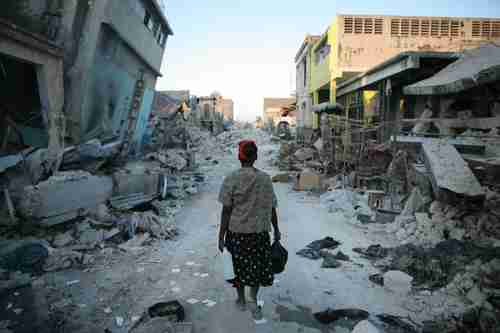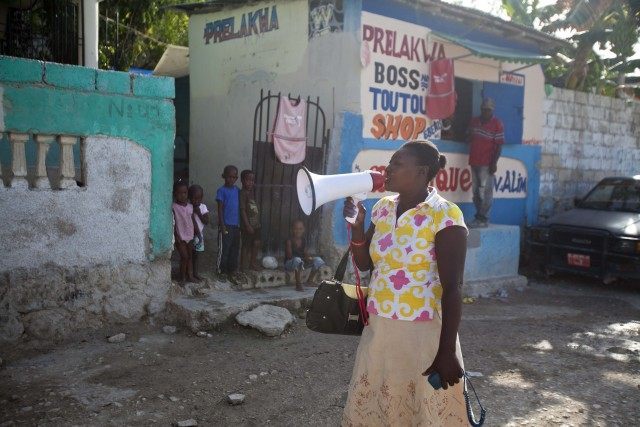This morning’s key headlines from GenerationalDynamics.com
- Haiti’s parliamentary elections promise little besides chaos
- Mulattos versus Noirs in Haiti
Haiti’s parliamentary elections promise little besides chaos

Haiti after the January 2010 earthquake
Today (Sunday), Haiti will hold its first parliamentary elections since the massive January 2010 earthquake that killed more than 200,000 Haitians, and devastated the entire country.
The elections were supposed to be held in 2011, but they were postponed repeatedly because of toxic Haitian politicians, led by president Michel Martelly, a former carnival singer known as “Sweet Micky.” Martelly was elected in 2011 as a supporter of the majority “noirs,” or descendants of slaves. The Parliament dissolved itself in January of this year, and since then Martelly has been governing by decree. Martelly is still popular, but these days he is accused of being too authoritarian, more in league with the minority “mulattos,” supported by international élites.
More than 1,800 candidates from dozens of parties will be on the ballots on Sunday, running for 138 open legislative seats. It will take days or weeks to count the ballots and determine the winners, and then there will be runoff elections on October 25. October 25 is also the day when presidential elections will take place. Martelly will not be eligible to run for another term, but there will be more than 50 other candidates for voters to choose from. If necessary, a presidential runoff election will take place on December 27.
It is hoped that with fresh leadership, the country can finally begin to recover from the 2010 earthquake.
There have already been huge amounts of money donated to rebuilding Haiti after the earthquake, but it does not seem to have done much good. Bill Clinton and the Clinton foundation raised millions of dollars. Celebrities organized high-profile benefits. The American Red Cross raised almost $500 million, promising to rebuild homes, schools and infrastructure. According to a recent investigation, the actual number of permanent homes built through the Red Cross in Haiti is six. Thanks to the investigation, Red Cross officials have been in the process of making excuses. The money appears to have gone into the pockets of crony organizations in the form of grants which the Red Cross says can’t be publicly disclosed. Apparently, these were all American organizations, not Haitian organizations, so little of the $500 million seems to have reached Haiti.
Because of the massive numbers of candidates, few people expect the elections to produce the kind of leadership that Haiti needs, or that Haiti will anytime soon be able to completely recover from the devastation of the 2010 earthquake. International Business Times and BBC and Chicago Tribune and NPR
Mulattos versus Noirs in Haiti

Light-skinned mulatto girl, with dark-skinned noir girl (AfroEurope)
During the 1700s, Haiti was an extremely wealthy French colony, thanks to crops sugar, rum, coffee and cotton — and thanks to the efforts of 500,000 slaves that the French had imported from Africa.
By the end of the 1700s, there were three groups of Haitians: The “whites,” native Europeans; the “noirs” or “blacks,” native black Africans whom the French imported as slaves; and the “mulattos,” the children of mixed European and African blood.
At that time, the mulattos were theoretically free, but in practice had as few rights as the noirs. In 1791, the noirs and the mulattos united in a violent slave rebellion that led to a 13-year civil war, resulting in formal recognition, in 1804, of Haiti as the second Republic in the Western hemisphere. However, the United States didn’t grant Haiti diplomatic recognition until 1862 — when Lincoln’s Emancipation Proclamation freed America’s slaves during the Civil War.
Today the mulattos are a small French-speaking minority, under 5% of the population, generally light-skinned, but a “market-dominant” minority, controlling well over 50% of the nation’s wealth. The noirs generally live in extreme poverty, and speak Creole, a mixture of French and African language elements. (Other different variations of Creole are spoken throughout the Caribbean, including parts of Louisiana.)
After the whites were overthrown in 1804, the mulattos became the new élite class. There was a new crisis civil war in the late 1840s, followed by several decades of peace and the growth of a Haitian intellectual culture. However, there was one bloodless coup after another, resulting in a succession of dozens of Presidents.
The 1915 coup was different, in that it turned into a major generational crisis rebellion. With total anarchy breaking out, President Woodrow Wilson eventually felt it necessary to take complete control of all governmental and financial institutions in Haiti.
The American armed forces remained in Haiti for 20 years, withdrawing only in 1934.
American armed forces came back in 1994, when it appeared that Haiti was once again heading for anarchy. The same thing happened in 2004. Now, since the earthquake, things are worse than ever.
Haiti is one of the most densely populated countries in the world, and is the poorest nation in the Western Hemisphere, with 60% of the population living under the poverty line, earning less than $2.44 a day. Racist hatred between the mulattos and noirs still runs deep in Haiti. Haiti is in a generational crisis era, and between the poverty and the racism, the future does not look good for the country. AfroEurope (Dec-2012) and The Star (Myanmar)
KEYS: Generational Dynamics, Haiti, Michel Martelly, Sweet Micky, Bill Clinton, Clinton Foundation, American Red Cross, mulattos, noirs, whites
Permanent web link to this article
Receive daily World View columns by e-mail

COMMENTS
Please let us know if you're having issues with commenting.